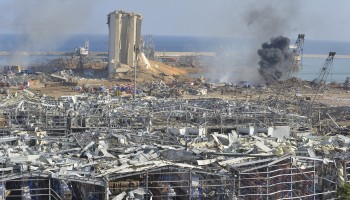Reported by
Trapped in Lebanon’s kafala sponsorship system—often described as a form of modern-day slavery—migrant workers face widespread abuse, ranging from verbal and physical violence to psychological harm and sexual exploitation, claims a report by Médecins Sans Frontières.
The kafala system is a sponsorship-based labor system used in several Middle Eastern countries that ties migrant workers’ legal status to their employers, often leading to exploitative and abusive working conditions.
These violations are frequently committed by employers and are enabled by a legal structure that excludes migrant workers from labor laws protecting other employees.
The kafala system “can rob them of their choices, rights, and even their voice,” according to the report, which documents the experiences of migrant workers treated at the MSF clinic in Bourj Hammoud, a northern suburb of Beirut, home to many vulnerable communities.
Workers described a pattern of mistreatment not only by employers, but also in state-run facilities such as hospitals and health centers, where some were denied treatment for lacking legal documents or for not being Lebanese.
Lebanon is home to an estimated 176,500 migrant workers, around 70 percent of whom are women. Nearly half work as domestic helpers, with many coming from Ethiopia, Bangladesh, and Sudan.
One Ethiopian migrant, using the pseudonym Makdes, recounted a harrowing experience with the first family she worked for. She said she was forced to survive on scraps.
“For the 15 days I spent in that house, I would wait until everyone was asleep to sneak some bread or an orange. I was living on scraps,” Makdes said. She added that her second employer treated her even worse, yelling at her, slapping her hand under the guise of teaching her tasks, and intimidating her for amusement.
The harsh and often inhumane conditions take a toll on mental health. “In 2024, psychiatric consultations in the Bourj Hammoud clinic have doubled compared to the previous year,” said Elsa Saikali, MSF mental health supervisor.
“Migrant workers are often dehumanised, subjected to racism and discrimination, and exposed to physical and sexual abuse. All this has deep repercussions on their psychological wellbeing.”
Beyond medical care, many migrants lack basic necessities such as shelter, food, and financial support, according to Hanan Hamadi, an MSF social worker at the Bourj Hammoud clinic.
Already among the most vulnerable populations in Lebanon, migrant workers have seen their hardship deepen amid the recent Israeli military campaign. Many have reportedly been left homeless or trapped in homes targeted by Israeli bombings after their employers fled.
Despite the immense challenges and dehumanization, some migrants choose to remain in Lebanon even after escaping abusive employers—often because they have nowhere else to go, or because they must continue to support their families. Others are simply unable to leave, lacking the funds for airfare or the documents needed to return home.






